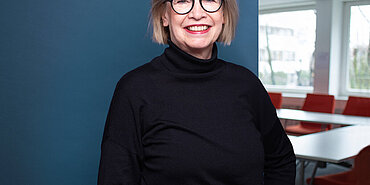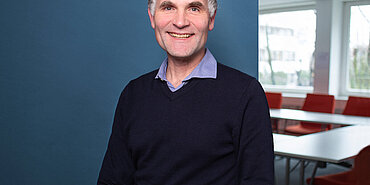IMECE, a networking meeting, takes place every other year and is organised jointly by Türkiye Ulusal Ajansı and JUGEND für Europa (the national agencies of the EU programmes Erasmus+ and European Solidarity Corps); IJAB, the International Youth Service of the Federal Republic of Germany; and the organisation Deutsch-Türkische Jugendbrücke. At last the attendees were able to travel to an in-person meeting again this year.
The participants’ delight at finally being able to meet again face to face was tangible – and clearly mirrored in the welcoming remarks of the representatives of the four partner organisations on 17 May, who invited everyone to make full use of the opportunities to get talking. And so it did not take long for the ice to break between the around 50 experts, some of whom have been working in the field of German-Turkish exchanges for a very long time, some of whom were there to connect to a potential partner organisation in the respective other country and also at home. “Very soon, the mass of attendees became a real group,“ as one participant put it.
Spotlight on mental health
Merve Kan (M.A. in Clinical Psychology) opened the afternoon session on 17 May with a presentation on young people’s mental health and wellbeing, a subject that is not unknown in Turkish society yet still often treated as taboo. Mental health had also been high up on the agenda of the first event in the 2022 IMECE series (IJAB article in German), with participants then asking for a more in-depth discussion of the matter. This is where Merve Kan’s presentation came in.
An expert in mental health and psychosocial support, specifically in humanitarian contexts in Turkey, Iraq and Nepal, Merve wanted to help the participating experts apply the theoretical aspects of mental health to the practicalities of their day-to-day work. This proved of such great interest to the audience that her 90-minute presentation slot developed into a lively 2.5 hour discussion session. It emerged that the Coronavirus pandemic has been instrumental in pushing the subject of mental health to the top of the public agenda – it’s becoming almost normal to talk about it. Merve repeatedly reminded her audience how important it was to remember one’s strengths and abilities because that, ultimately, is what constitutes mental wellbeing: to feel able to successfully navigate life’s challenges. She also pointed out how important it was, when talking to young people in potentially difficult situations, to show empathy while keeping one’s distance. As one participant put it, “we have to learn to listen”. Finally, in a practical exercise experts outlined difficult situations they had experienced and shared how they had dealt with them, for instance by confronting problems head-on, exiting from a difficult situation and putting some distance between the protagonists where necessary, or asking for help from a third party.
Day 1 of IMECE 2022 ended with an session about the projects run by participating organisations and institutions, about which a lively discussion ensued – a great opportunity for the experts to continue building their network.
Workshops and field trips to local projects
Day 2 began with a number of workshops on various issues. Sustainability proved very popular, with around 20 experts opting for the session on Green Youth Work. This kicked off with a presentation by Neringa Tumėnaitė from the EU-CoE Youth Partnership’s Pool of European Youth Researchers, who led the consultation process and oversaw the production of the Sustainability Checklist on Greening the Youth Sector. The subsequent discussion in small groups revealed some major differences between organisations both in Germany and in Turkey. Some still have a lot of catching up to do. There are plenty of ideas, such as enforcing waste separation in schools and youth clubs, or talking to students and parents who have not given much thought to sustainability so far. Workshop participants were delighted at the hands-on recommendations in the Sustainability Checklist, which are helpful when navigating what can seem like an overwhelming challenge. One participant suggested creating a database of institutions that already have sustainable practices and to use this for Turkish-German youth exchange-related events. Overall, the sustainability workshop was an eye-opening experience for both the German and the Turkish participants and inspired everyone to keep improving their track record in this area.
Participants at the workshops on youth participation and inclusion & diversity were also kept busy. Those in the former group were given an introduction to Deep Democracy, a method for decision-making involving young people. On one point, everyone agreed: youth participation is one of the most important themes and concepts there are. However, young people are not a homogeneous group so, as one participant phrased it, “adults need to support them as they approach adulthood and encourage them to make their own choices”. The workshop attendees suggested making democracy and participation a priority theme of IMECE.
A role-play session took place during the inclusion & diversity workshop, which required planning a journey in such a way that everyone can join and enjoy it. This revealed that not even youth work experts are immune to stereotyping and prejudice. However, the participants agreed that the workshop certainly helped to refresh everyone’s basic knowledge of the subject and look at it from different angles.
Visits to institutions and projects in and around Antalya on the afternoon of day 2 gave participants an insight into the work being done at various levels – local, regional and national. The existence of a sustainable farm near Antalya is an example of a local community project practicing an awareness of environmental issues while offering Education for Sustainable Development activities. The NGO OBA Nature Association offers seminars and residential projects for children and adolescents to teach them about the importance of nature conservation. OBA is part of a strong international network and participates in a large number of Erasmus projects.
After the field trip to the Muratpaşa Youth Center in Antalya some questions remained unanswered, for instance about the young people using it, since they were not present during the visit. Neither were the structures clear. However, the guests were able to meet with the Turkish swimmer Sefa Yurtkölesi, who was born with a genetic disorder known as TAR syndrome and has won several national championships, and Yavuz Gürhan, the director of youth and sports affairs of Antalya province.
During a visit to an institution run by Antalya’s family and social services agency, which reports to the Ministry of Family and Social Services, participants learned about how it provides care to children and adolescents aged 0 to 18, in this particular case just boys, who can no longer live with their parents for various reasons. In cases like these, residential youth services, specifically accommodation, social support and education, are provided by the state. Should the young residents not go on to university when they turn 18 and want to leave the home, they are made a job offer that they can reject once. If they reject the next offer as well, they are expected to continue looking for employment without assistance. Those who go on to higher education continue to receive government support until they turn 25. To prevent parents from sending their children to an institution like this in the hope they will be taken care of, the Turkish government examines each case very carefully.
New project ideas
The last day of IMECE 2022 was given over to a project workshop, with participants listening to a series of brief presentations on various sources of funding for German-Turkish exchanges. They then formed mixed teams and worked on new project ideas. This resulted in a large number of different projects, for some of which an application will be submitted in time for the next round of Key Action 1 and 2 projects under Erasmus+ Youth.
Summary
If the participants were granted the superpowers they said they wanted at the beginning of the three-day event, the world would surely be a better place: safer, greener, and more inclusive. Now the work begins on translating all the ideas generated during IMECE and the spirit that developed into practice. As someone said when the meeting began: every encounter delivers something new and in turn, it delivers change. See you at IMECE 2024!














































